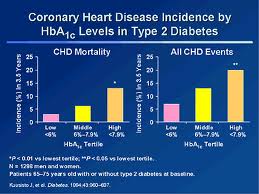Successful treatment of type 1 diabetes in the past usually meant compliance in taking insulin shots and paying attention to a diabetic diet. Since the arrival of specific lab tests like the HbA1c levels, patient education has become more sophisticated: it is not enough to just be on shots, eat sensibly and otherwise hope for the best. As a result, it is a must for patients to monitor their glucose levels closely.
Research that was presented at the American Diabetes Association during the 65th annual scientific session spelled out the benefits very clearly: strict control of glucose levels helps patients with type 1 diabetes to decrease the risk of stroke and cardiovascular disease by 57%!
It has been known that tight glucose control helped to reduce diabetic nephropathy (kidney disease) and diabetic retinopathy (eye disease) in diabetics, but this is the first time that controlling glucose levels has been associated with cardiovascular disease, reports the main investigator, Dr.David Nathan from, director of the diabetes center at Massachusetts General Hospital in Boston. He also reported that every 1% reduction in HbA1c (glycosated hemoglobin) correlated with a 20% reduction in cardiovascular risk for the diabetes type 1 patient.
These findings are significant, as the risk reduction is larger than seen in any other trials, like administering medication (statins) or placing stents.
A similar risk reduction may also occur in patients with type 2 diabetes, but at this point no specific research on this group is available. In the meantime it is of great importance to any patient with type 1 diabetes.
More information about:
1. Diabetes treatment: http://nethealthbook.com/hormones/diabetes/type-2-diabetes/treatment-type-2-diabetes/
2. Heart attacks: http://nethealthbook.com/cardiovascular-disease/heart-disease/heart-attack-myocardial-infarction-or-mi/
Reference: The Medical Post, July 5,2005,page1, 58.
Last edited October 29, 2014






